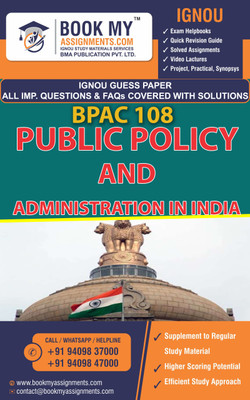IGNOU BPAC 108 Public Policy and Administration in India | Guess Paper | Important Question Answer |BACHELOR'S (HONOURS) DEGREE PROGRAMMES(Paperback, BMA Publication)
Quick Overview
Product Price Comparison
Introduction to Indian Governance: The course would likely begin with an overview of the Indian political system, including its constitutional framework, federal structure, and separation of powers between the central government, state governments, and local bodies.Historical Context: Students would explore the historical evolution of public administration and public policy in India, tracing key developments from colonial rule to independence and beyond. This could involve studying the legacies of British colonial administration and the challenges of nation-building in a diverse and complex society.Constitutional Provisions: The course may cover the constitutional provisions related to public administration and governance in India, including the distribution of powers, fundamental rights, directive principles of state policy, and constitutional amendments relevant to administrative reforms.Policy-Making Process: Students would study the policy-making process in India, including the role of different institutions and actors such as the executive, legislature, judiciary, bureaucracy, political parties, interest groups, and civil society organizations. This could involve analyzing the stages of policy formulation, implementation, and evaluation.Administrative Structures and Institutions: The course would likely examine the administrative structures and institutions at the central, state, and local levels in India, including government departments, ministries, regulatory bodies, and autonomous agencies. Students would study the functions, responsibilities, and challenges faced by these institutions in delivering public services and implementing policies.Decentralization and Local Governance: Students would explore the principles and practices of decentralization and local governance in India, including the role of Panchayati Raj institutions and urban local bodies in grassroots democracy, development planning, and service delivery. This could involve studying constitutional amendments related to decentralization and initiatives such as the 73rd and 74th Constitutional Amendments.Public Policy Analysis: The course may cover approaches to public policy analysis in the Indian context, including methods for assessing policy alternatives, evaluating policy outcomes, and conducting cost-benefit analysis. Students would study case studies and examples of policy issues and challenges in areas such as education, healthcare, agriculture, infrastructure, and environment.


